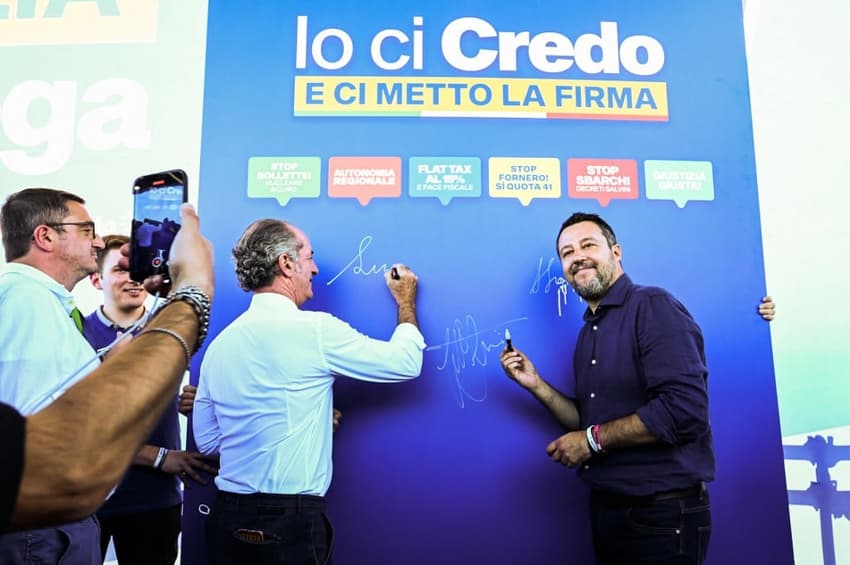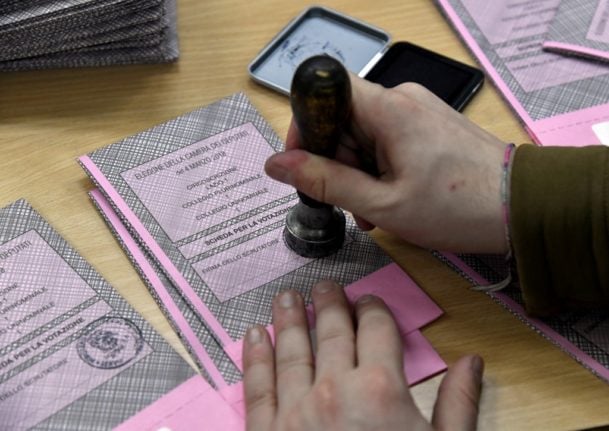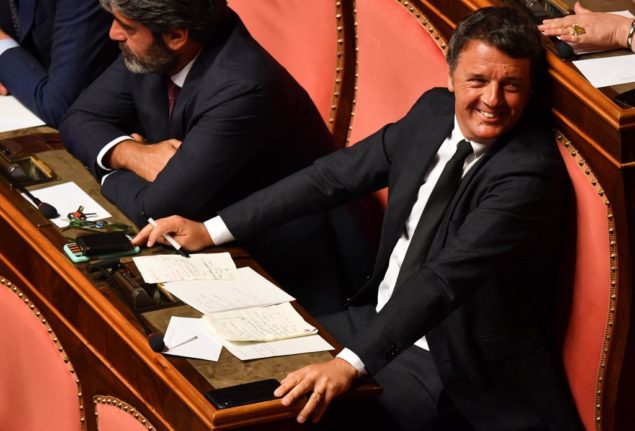The Italian vocabulary you'll need to follow the elections

Italian political goings-on are famously unpredictable, but they don't have to be impossible to understand. Here's a guide to the words and phrases you need to know ahead of Italy's crucial elections this Sunday.
Italian politics is hard enough to follow even for those with a lifetime's experience of the political system and fluency in the language. For foreigners trying to follow events, it can be extremely confusing.
But once you're armed with a bit of background knowledge and some specifically Italian political language, Italian politics does get easier to understand (at least, most of the time).
READ ALSO: Your ultimate guide to Italy’s crucial elections on Sunday
With Italy preparing for crucial general elections on Sunday, September 25th, it’s especially important to be able to at least get the gist of what’s going on.
From vocabulary basics to the peculiarities of Italian ‘politichese’, here’s The Local’s guide to the language you’ll need when following the election and political news in the coming weeks.
The basics
You may already have a good grasp of some basic political vocabulary, such as partiti politici (political parties) and i sondaggi (opinion polls).
L'elezione is 'the election', but Italians use the plural form (le elezioni) for general elections since voters will be choosing representatives in both the upper and lower houses of parliament.
The names for the two parts of parliament are la Camera dei Deputati (Chamber of Deputies – the Lower House) and il Senato della Repubblica (the Senate of the Republic – the Upper House).
READ ALSO: An introductory guide to the Italian political system

Italians vote on September 25th in elections expected to bring easy an victory for far-right and right-wing populist parties. Photo by Andreas SOLARO / AFP
The system is anything but simple: it's a mixed voting system with some seats allocated via proportional representation ('un sistema proporzionale') and others by first-past-the-post (uninominale secco).
Don't be alarmed if, on election day (il giorno di voto), you hear people talking about urns, or urne. Like its English equivalent, an 'urna' is a kind of vase or container, but in Italian it's used to refer to the ballot box, rather than anything to do with funerals. In Italian, andare alle urne means to 'go to the polls', or to cast your vote.
You do this using a scheda elettorale, or ballot paper - in fact, voters get two ballot papers - one for each house of parliament - at the polling booth (cabina elettorale). Or you might not: abstaining from voting (astensionismo) is increasingly common in Italy.
As soon as voting ends, we'll get an exit poll (this one's easy - 'gli exit poll') and by the early hours of the morning, we should have the early results (risultati preliminari)
The parties - and campaign slogans
Italy has a large number of political parties and an ever-shifting political landscape, meaning some of the bigger names in this election may already be familiar while others were previously unknown.
Here's a quick rundown of the main parties in the mix this time, their names in both Italian and English, and the slogans they're using:
Brothers of Italy (Fratelli d’Italia, or FdI).
Slogan: 'Pronti' - The hard-right party expected to take the largest share of the vote has the single word slogan pronti, meaning 'are you ready?'
READ ALSO: Political cheat sheet: Understanding the Brothers of Italy

Is Italy ready for election season, and a new government? - A campaign poster shows hard-right Brothers of Italy party leader Giorgia Meloni, who is likely to become the next prime minister. Photo: Marco BERTORELLO / AFP
The League (Lega)
Slogan: 'Credo' - meaning 'I believe'. Matteo Salvini's right-wing populist party was told off by Catholic bishops for using a slogan with religious themes in attempt to appeal to the country's conservative, religious voters. Posters have since featured various longer slogans, including 'credo negli italiani' (I believe in the Italians).
Five Star Movement (Movimento Cinque Stelle, M5S)
Slogan: 'Dalla parte giusta' - The populist party now headed by former PM Giuseppe Conte has chosen a simple slogan meaning 'on the right side'.
Democratic Party (Partito democratico, PD)
Slogan: 'Scegli' - another one-word campaign slogan, this one means 'choose'. Political analysts say it's being used by Italy's second-biggest party as a way to highlight its opposition to Brothers of Italy.

Italian Democratic Party (PD) leader Enrico Letta is asking voters to 'choose' his party over the ruight-wing coalition. Photo by Vincenzo PINTO / AFP
Azione + Italia Viva (Action and Italy Alive)
Slogan: 'Italia, sul serio' - These two small centrist parties are running together for election, presenting themselves as the sensible, moderate choice with the campaign slogan 'Italy, seriously'.
Forza Italia (Variously translated as 'Go Italy' or 'Forward Italy')
Slogan: none. Silvio Berlusconi's party has chosen not to use one particular slogan this time, though some campaign posters feature the words 'oggi più che mai', meaning 'now more than ever'.
Find our complete guide to who’s who in the Italian elections here.
Italian ‘politichese’
Political-speak (or ‘politichese’) can be as dense and impenetrable in Italian as in any other language.
But it can also be illuminating to learn a few of the words and phrases used in political discussions (and by journalists in particular) to describe the peculiarities of the Italian system.
Here are a few examples:
Toto-nomi
The prefix toto- is used in Italian news reports wherever speculation abounds: it comes from the football pools or totalizzatore calcistico (‘Football totalizer’, or football sweepstake), known as Totocalcio for short.
Totonomi then translates as something like ‘name sweepstake’. It’s an adaptation of toto-nomine (‘nomination sweep’) – which at election time is used for speculation about the most widely-tipped candidates for various offices.
You’ll also see toto- in totopoltrone (‘parliamentary seat sweep’), or totoministri (‘minister sweep’, referring to who will make the cabinet in a newly elected government).
A variation on this is fantapolitica, which similarly comes from fantacalcio, or Italian fantasy football. This word is used to talk about hypothetical election results, government coalitions, and future cabinet members, whether these are realistic or improbable: fantasy politics, if you will.

Former Prime Minister Matteo in parliament. Photo by Andreas SOLARO / AFP
Ipotesi
An ipotesi is, as you might guess, a hypothesis or theory. When used in newspaper headlines, it fulfils a similar role to toto~, allowing journalists to speculate as to what may have happened or be about to happen.
In the context of election news, you’ll usually see ipotesi followed by the last name of a potential nominee, e.g. ‘l’ipotesi Melonii‘ or ‘l’ipotesi Conte‘, along with discussion of the likely success of that person’s policy or candidacy.
Trasformismo
A time-honoured Italian tradition, this is the act of switching your political allegiance depending on how the wind blows.
Gattopardismo
Un gattopardo is a leopard, so what is 'gattopardismo'? Not too distant from trasformismo, it's a word used to describe the act of adapting your attitudes to the changing political climate in order to maintain a position of power and influence - something political figures in Italy are regularly accused of doing.
The concept was described in the book Il gattopardo by Giuseppe Tomasi di Lampedusa, the most frequently-quoted line of which is: "Se vogliamo che tutto rimanga come è, bisogna che tutto cambi" (If we want everything to remain as it is, everything must change).
Poltrone
Why would a power-hungry politician be keen to deny that he is “hunting for armchairs”? In this case, such a statement has nothing to do with furniture shopping. Una poltrona does of course mean “armchair” or “seat” and it can be used to talk about a job or position within a company, or in this case, a government.
READ ALSO: Q&A: Your questions answered on how Italy’s elections work
In a political context, a politician on the hunt for poltrone is attempting to gain important 'seats' or positions for his party members within the government. Expect to see this word in news reports following the election.
Political nicknames
Some politicians and political parties in Italy have well-known nicknames.
For example, the League is sometimes referred to as ‘Il Carroccio’, the name for a medieval ox-drawn altar used for pre-battle church services. This was used as a symbol by the party back when it was called the Northern League.
And League leader Matteo Salvini is often referred to by his supporters as ‘Il Capitano’, or ‘The Captain’, which seems to be a reference to his preferred policy of leaving migrant rescue ships stranded at sea.
Meanwhile, Italia Viva leader and former PM Matteo Renzi is known as “il rottomatore” (“the scrapper”, or “the wrecker”) due to his unpopular habit of destabilising coalition governments.
Silvio Berlusconi meanwhile is often referred to in media reports as “l'immortale” (the immortal) because of his long political career, which continues today despite numerous sex scandals, a tax fraud conviction, regular health scares, and his advancing age.
There are of course plenty of other, more insulting nicknames used in Italian politics, which we won't list here.
Is there another word or phrase you think we should add to the list? Please get in touch by email and let us know.
Comments
See Also
Italian politics is hard enough to follow even for those with a lifetime's experience of the political system and fluency in the language. For foreigners trying to follow events, it can be extremely confusing.
But once you're armed with a bit of background knowledge and some specifically Italian political language, Italian politics does get easier to understand (at least, most of the time).
READ ALSO: Your ultimate guide to Italy’s crucial elections on Sunday
With Italy preparing for crucial general elections on Sunday, September 25th, it’s especially important to be able to at least get the gist of what’s going on.
From vocabulary basics to the peculiarities of Italian ‘politichese’, here’s The Local’s guide to the language you’ll need when following the election and political news in the coming weeks.
The basics
You may already have a good grasp of some basic political vocabulary, such as partiti politici (political parties) and i sondaggi (opinion polls).
L'elezione is 'the election', but Italians use the plural form (le elezioni) for general elections since voters will be choosing representatives in both the upper and lower houses of parliament.
The names for the two parts of parliament are la Camera dei Deputati (Chamber of Deputies – the Lower House) and il Senato della Repubblica (the Senate of the Republic – the Upper House).
READ ALSO: An introductory guide to the Italian political system

The system is anything but simple: it's a mixed voting system with some seats allocated via proportional representation ('un sistema proporzionale') and others by first-past-the-post (uninominale secco).
Don't be alarmed if, on election day (il giorno di voto), you hear people talking about urns, or urne. Like its English equivalent, an 'urna' is a kind of vase or container, but in Italian it's used to refer to the ballot box, rather than anything to do with funerals. In Italian, andare alle urne means to 'go to the polls', or to cast your vote.
You do this using a scheda elettorale, or ballot paper - in fact, voters get two ballot papers - one for each house of parliament - at the polling booth (cabina elettorale). Or you might not: abstaining from voting (astensionismo) is increasingly common in Italy.
As soon as voting ends, we'll get an exit poll (this one's easy - 'gli exit poll') and by the early hours of the morning, we should have the early results (risultati preliminari)
The parties - and campaign slogans
Italy has a large number of political parties and an ever-shifting political landscape, meaning some of the bigger names in this election may already be familiar while others were previously unknown.
Here's a quick rundown of the main parties in the mix this time, their names in both Italian and English, and the slogans they're using:
Brothers of Italy (Fratelli d’Italia, or FdI).
Slogan: 'Pronti' - The hard-right party expected to take the largest share of the vote has the single word slogan pronti, meaning 'are you ready?'
READ ALSO: Political cheat sheet: Understanding the Brothers of Italy

The League (Lega)
Slogan: 'Credo' - meaning 'I believe'. Matteo Salvini's right-wing populist party was told off by Catholic bishops for using a slogan with religious themes in attempt to appeal to the country's conservative, religious voters. Posters have since featured various longer slogans, including 'credo negli italiani' (I believe in the Italians).
Five Star Movement (Movimento Cinque Stelle, M5S)
Slogan: 'Dalla parte giusta' - The populist party now headed by former PM Giuseppe Conte has chosen a simple slogan meaning 'on the right side'.
Democratic Party (Partito democratico, PD)
Slogan: 'Scegli' - another one-word campaign slogan, this one means 'choose'. Political analysts say it's being used by Italy's second-biggest party as a way to highlight its opposition to Brothers of Italy.

Azione + Italia Viva (Action and Italy Alive)
Slogan: 'Italia, sul serio' - These two small centrist parties are running together for election, presenting themselves as the sensible, moderate choice with the campaign slogan 'Italy, seriously'.
Forza Italia (Variously translated as 'Go Italy' or 'Forward Italy')
Slogan: none. Silvio Berlusconi's party has chosen not to use one particular slogan this time, though some campaign posters feature the words 'oggi più che mai', meaning 'now more than ever'.
Find our complete guide to who’s who in the Italian elections here.
Italian ‘politichese’
Political-speak (or ‘politichese’) can be as dense and impenetrable in Italian as in any other language.
But it can also be illuminating to learn a few of the words and phrases used in political discussions (and by journalists in particular) to describe the peculiarities of the Italian system.
Here are a few examples:
Toto-nomi
The prefix toto- is used in Italian news reports wherever speculation abounds: it comes from the football pools or totalizzatore calcistico (‘Football totalizer’, or football sweepstake), known as Totocalcio for short.
Totonomi then translates as something like ‘name sweepstake’. It’s an adaptation of toto-nomine (‘nomination sweep’) – which at election time is used for speculation about the most widely-tipped candidates for various offices.
You’ll also see toto- in totopoltrone (‘parliamentary seat sweep’), or totoministri (‘minister sweep’, referring to who will make the cabinet in a newly elected government).
A variation on this is fantapolitica, which similarly comes from fantacalcio, or Italian fantasy football. This word is used to talk about hypothetical election results, government coalitions, and future cabinet members, whether these are realistic or improbable: fantasy politics, if you will.

Ipotesi
An ipotesi is, as you might guess, a hypothesis or theory. When used in newspaper headlines, it fulfils a similar role to toto~, allowing journalists to speculate as to what may have happened or be about to happen.
In the context of election news, you’ll usually see ipotesi followed by the last name of a potential nominee, e.g. ‘l’ipotesi Melonii‘ or ‘l’ipotesi Conte‘, along with discussion of the likely success of that person’s policy or candidacy.
Trasformismo
A time-honoured Italian tradition, this is the act of switching your political allegiance depending on how the wind blows.
Gattopardismo
Un gattopardo is a leopard, so what is 'gattopardismo'? Not too distant from trasformismo, it's a word used to describe the act of adapting your attitudes to the changing political climate in order to maintain a position of power and influence - something political figures in Italy are regularly accused of doing.
The concept was described in the book Il gattopardo by Giuseppe Tomasi di Lampedusa, the most frequently-quoted line of which is: "Se vogliamo che tutto rimanga come è, bisogna che tutto cambi" (If we want everything to remain as it is, everything must change).
Poltrone
Why would a power-hungry politician be keen to deny that he is “hunting for armchairs”? In this case, such a statement has nothing to do with furniture shopping. Una poltrona does of course mean “armchair” or “seat” and it can be used to talk about a job or position within a company, or in this case, a government.
READ ALSO: Q&A: Your questions answered on how Italy’s elections work
In a political context, a politician on the hunt for poltrone is attempting to gain important 'seats' or positions for his party members within the government. Expect to see this word in news reports following the election.
Political nicknames
Some politicians and political parties in Italy have well-known nicknames.
For example, the League is sometimes referred to as ‘Il Carroccio’, the name for a medieval ox-drawn altar used for pre-battle church services. This was used as a symbol by the party back when it was called the Northern League.
And League leader Matteo Salvini is often referred to by his supporters as ‘Il Capitano’, or ‘The Captain’, which seems to be a reference to his preferred policy of leaving migrant rescue ships stranded at sea.
Meanwhile, Italia Viva leader and former PM Matteo Renzi is known as “il rottomatore” (“the scrapper”, or “the wrecker”) due to his unpopular habit of destabilising coalition governments.
Silvio Berlusconi meanwhile is often referred to in media reports as “l'immortale” (the immortal) because of his long political career, which continues today despite numerous sex scandals, a tax fraud conviction, regular health scares, and his advancing age.
There are of course plenty of other, more insulting nicknames used in Italian politics, which we won't list here.
Is there another word or phrase you think we should add to the list? Please get in touch by email and let us know.
Join the conversation in our comments section below. Share your own views and experience and if you have a question or suggestion for our journalists then email us at [email protected].
Please keep comments civil, constructive and on topic – and make sure to read our terms of use before getting involved.
Please log in here to leave a comment.